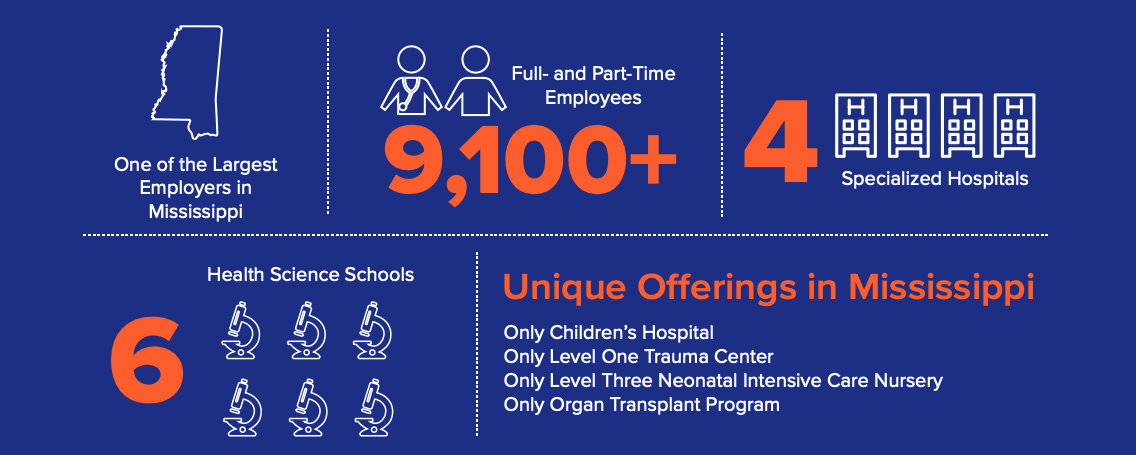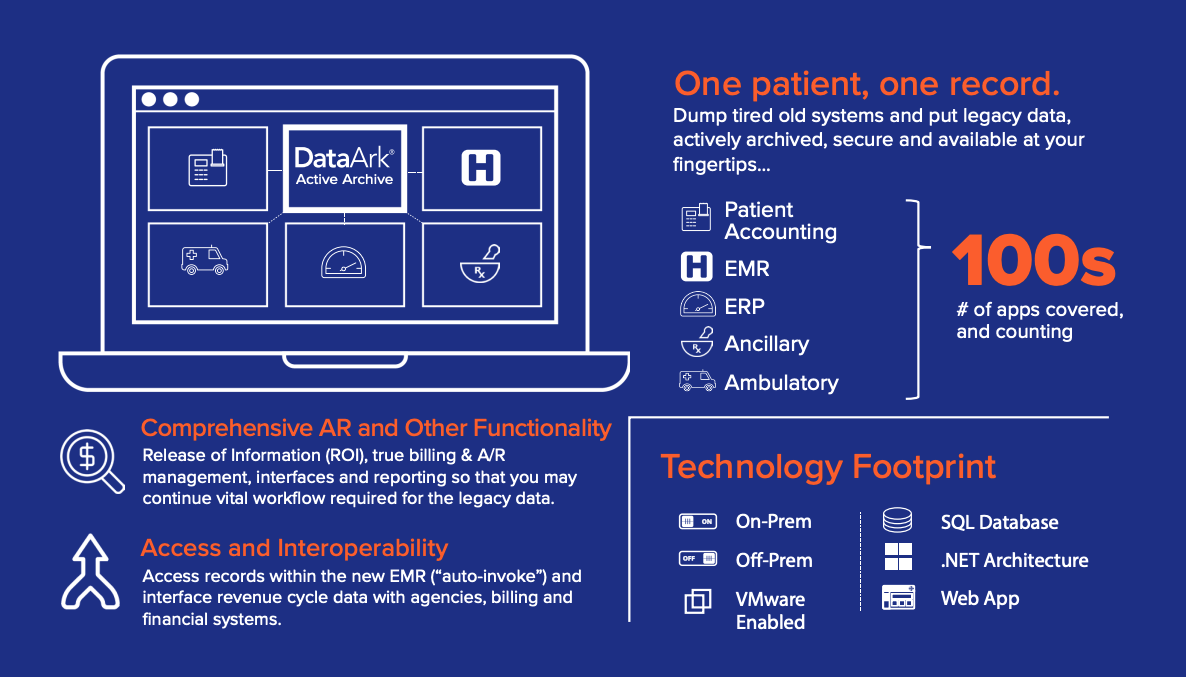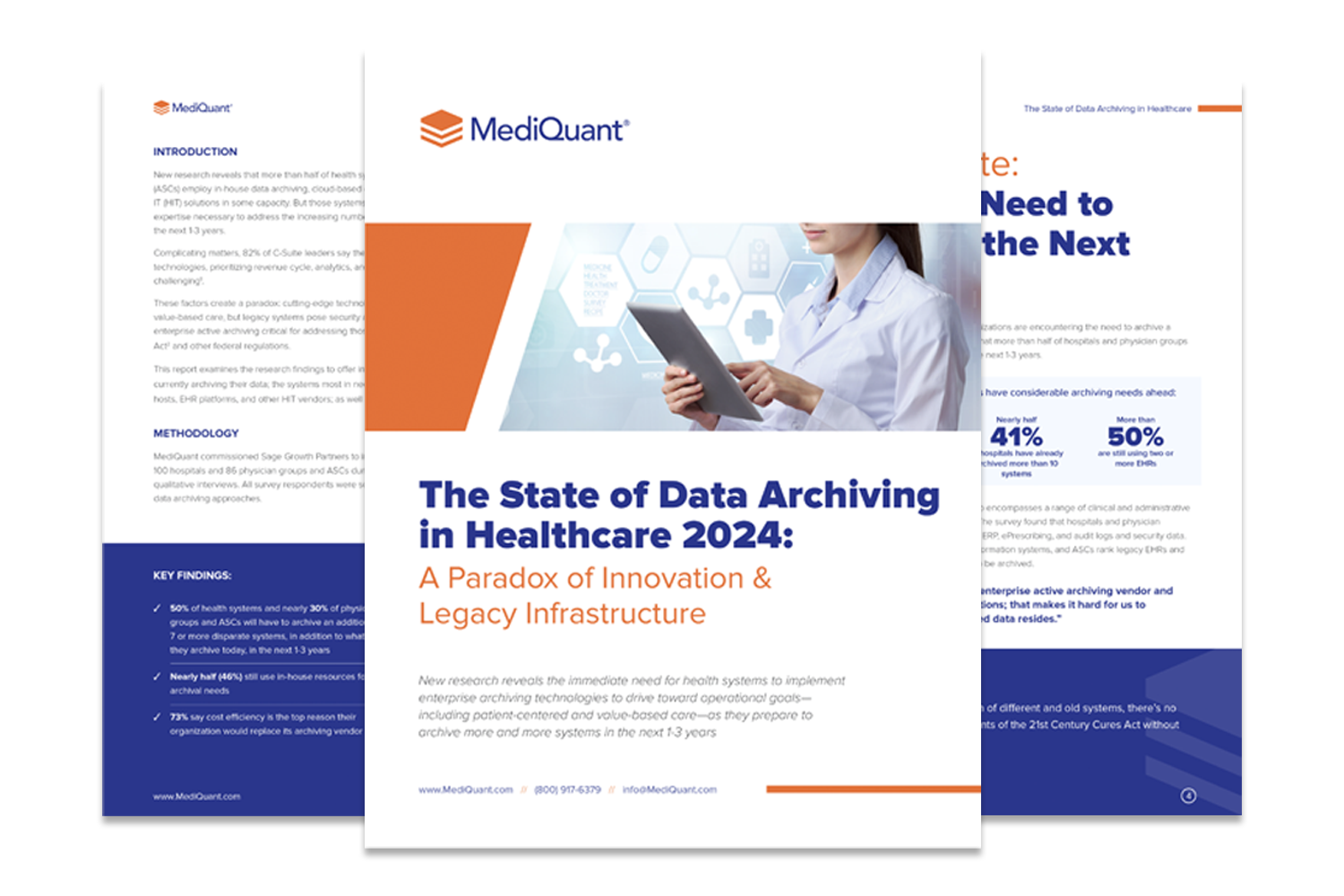University of Mississippi Medical Center selected DataArk® as the solution for decommissioning legacy clinical and financial data. The center now has 21 million accounts in a secure, accurate “active archive” system.
A Simple Solution for a Complex Project
The University of Mississippi Medical Center needed an “active archive” system to archive both clinical and financial electronic medical records totaling 21 million accounts under a stringent deadline. MediQuant provided its user-friendly archiving system DataArk® which ensures record retention, user ease and compliance at the click of a mouse.
Profile
The University of Mississippi Medical Center (UMMC), located in Jackson, is the state’s only academic health science center. UMMC encompasses six health science schools: medicine, nursing, dentistry, health related professions, graduate studies and pharmacy. Four specialized hospitals on the Jackson campus include the only children’s hospital in Mississippi, a women and infants’ hospital, and a critical care hospital. UMMC offers the only level one trauma center, the only level three neonatal intensive care nursery and the only organ transplant program in the state. With more than 9,100 full- and part-time employees, UMMC is one of the largest employers in Mississippi.

The Challenge
UMMC had recently completed the successful system-wide implementation of Epic. With the Epic Electronic Health Record (EHR) project completed, the technology team identified an opportunity to decommission its mainframe based legacy systems for a potential savings of several million dollars over a three-year period. However, the hospital had to complete the migration by year’s end, which was just months away, to realize the savings.
The UMMC team faced a number of potential challenges in the decommissioning process in addition to the tight turn-around time. The system had a large number of users, making it difficult to identify everything on the mainframe, as well as who owned the data. Other concerns with the former software included security of the data and compliance with HIPAA regulations.

UMMC initially focused on three of the largest hospital information systems on the mainframe: Siemens Invision, Siemens Signature and Siemens Lifetime Clinical Records. There were many other applications on the mainframe that needed to be decommissioned as well. One of the challenges faced in this project was the enormous volume of both clinical and financial data to be archived.
The Solution
The University of Mississippi Medical Center emphasized that data security and maintaining the integrity of the data during migration was paramount. The data had to be inaccessible to others, but highly accessible to UMMC employees. The solution required intuitive interfaces with which users were comfortable and which wouldn’t require extensive training. Since large volumes of both financial and clinical data were being moved, the solution had to be robust, reliable and flexible.
“It was imperative that UMMC find a solution that would both address technical and compliance concerns and keep the decommissioning project on track with the deadline. MediQuant quickly validated our experience in both financial and clinical archiving.”


To accommodate UMMC’s financial archiving needs, DataArk provided an “active archive.” This form of data archiving allowed users real time access to view data and run reports, while they continued to actively work down outstanding accounts receivable. End users were able to continue to bill accounts, post payments, make adjustments and transfers, add notes, and interface with other UMMC vendors or agencies.
DataArk also provided a patient-centric, longitudinal view of clinical data which fulfilled UMMC’s clinical archiving requirements. Through Epic’s auto invoke feature, UMMC physicians were now able to access the historical patient data necessary to make informed decisions with one simple click from within their Epic system. This eliminated the costly necessity of maintaining support for the old decommissioned legacy systems, as well as the need to physically search for old records, saving time and labor costs.
Why Active Archive with DataArk?
- Active archiving grants users the necessary functionality of a legacy system without the expense and risks. Data is kept active for quickly retrieving files, easily updating old records and continuing to bill accounts.
- To reduce risk of lost or misplaced data, and to meet transfer deadlines, data is migrated instead of converted.
- DataArk serves as a single access point where many different legacy applications can be consolidated to simplify the IT landscape.
Implementation
The Epic “go-live” was completed in June and by late August the decision was made to decommission the mainframe and its major applications. A dedicated project team of UMMC and MediQuant staff was assembled and work began in early September with a December 31 deadline.
There were some significant risks in ensuring that the transfer of data was secure and in compliance with HIPAA regulations. The project teams began by tackling the validation spreadsheet created for them by MediQuant to ensure a clean one-to-one transfer of data . Validating the data and making sure the extracts were accurate and complete was critical. There was both clinical and financial data, so it was crucial to extract complete records for all patients. Both teams paid close attention to data extraction from the former system to create a first-class “active archive” system. UMMC downloaded the data to secure drives and sent the drives overnight to MediQuant.
MediQuant runs a thorough review of data from any system through a process involving nearly 450 scripts on the data, whether active or static. This process identifies any variances, so they can be fixed prior to migrating the data into the DataArk system.
The migration of data had to be completed in a very short time frame in order for UMMC to realize the substantial savings. One critical element in meeting the deadlines was the UMMC and MediQuant joint team’s commitment to accurately set key milestone dates for certain tasks to be completed.
Effective communication was the cornerstone of the project’s success. MediQuant team members met with key stakeholders, physicians, revenue cycle management teams, health informatics teams and others regarding important details of the migration process. The joint team also met internally three times per week, once for each of the systems being decommissioned. Everyone involved realized the commitment that was required in order to successfully complete a project of this size and scope in a tight deadline

“DataArk proved to have the capabilities and track record to move forward with this partnership. Through a strong work plan, proven methodology and communication between both teams, our deadline was realized and UMMC was able to save millions of dollars. MediQuant’s expertise allowed our client to reach its goal in just 90 days.”
The Results
It is nearly unheard of to accomplish a project of this size and scope within a three-month timeframe. However, using MediQuant’s DataArk, UMMC was able to safely migrate huge volumes of data from the legacy systems in three months. On the financial end, 950,000 distinct medical records and eight million patient accounts were migrated. The clinical count landed at 794,000 distinct medical records.
“DataArk proved to have the capabilities and track record to make UMMC feel comfortable moving forward with this partnership,” said MediQuant Founder and Chairman Tony Paparella. “Through a strong work plan and proven methodology, our deadline was realized and UMMC was able to save millions of dollars. MediQuant’s expertise allowed our client to reach its goal in just 90 days. We are very proud of this joint project.”
UMMC completed the data migration as planned and moved into 2013 with its new MediQuant archiving solution in place. UMMC now has a robust application with more than 5,000 registered end users and more than 200 concurrent users at any given time.
Using DataArk allowed the University of Mississippi Medical Center to migrate millions of user accounts to a secure, compliant archive system that is user friendly and provided millions of dollars in savings for the hospital.


